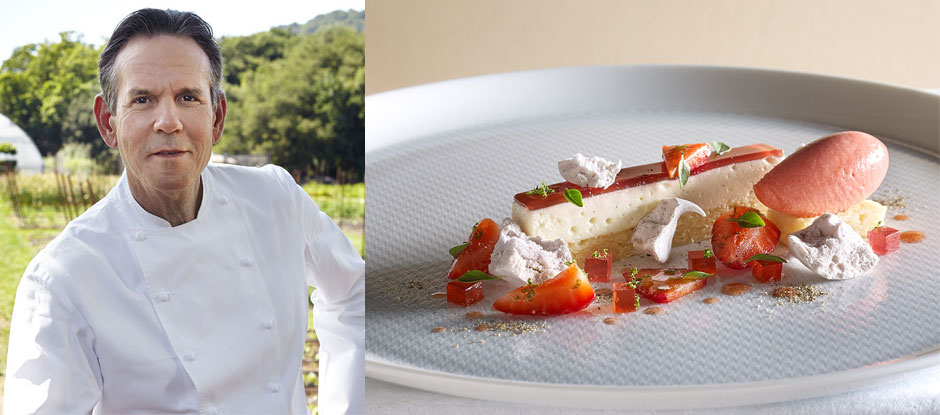Header: Thomas Keller and strawberry cheesecake (all images: Deborah Jones)
After a major refit of his iconic restaurant The French Laundry in Yountville, California, Thomas Keller continues to fly the flag for evergreen evolution. In the sixth instalment of our Best and Beyond series, presented by Miele, America’s ultimate culinary mentor.
On a Monday morning, the grassy courtyard of The French Laundry is as serene as a cloister garden. Apart from a woman bearing armloads of fresh flowers to replenish the dining room, there is no trace of the night before: the sabering of a bottle of 2006 Dom Perignon, the salmon cornets presented in polished sterling silver holders, and the 62 diners – the usual full house – making their way to their tables for a leisurely evening of nine delicate courses.
Chef Thomas Keller takes a seat just outside the wall of windows enclosing his new kitchen, the centrepiece of The French Laundry’s $10 million renovation, while inside about a dozen cooks smoothly begin preparations for evening service, when the performance will begin all over again, as it has for 23 years.
“The Louvre was the inspiration,” Keller says, with a gesture that takes in the kitchen – with its billowing white ceiling, meant to mimic an unfurled tablecloth – as well as the other components of the renovation. Designed by Snohetta, the architectural firm behind the expansion of the San Francisco Museum of Modern Art, Keller’s intimate Napa Valley restaurant now encompasses the original 1900 stone building, a new modernist structure sheathed in dark wood and housing a private dining room and a 16,000-bottle wine cellar, and less obvious touches such as soft landscaping and geothermal and solar energy systems.
“The Louvre is historic for its time and place,” Keller continues, “the same way The French Laundry is, but I.M. Pei changed the whole dynamic of the Louvre with the glass pyramid. That juxtaposition of the historic and the contemporary was something I wanted to achieve here, too.”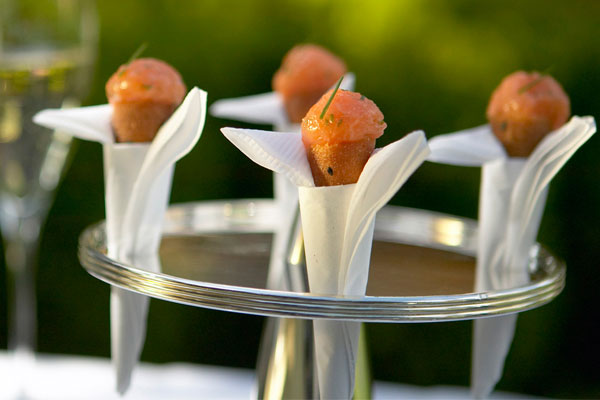
Salmon cornets (image: Deborah Jones)
Keller is a master of that sensitive balance between classic and modern, French and American, refined and witty. In an era of pop-up restaurants and rough-edged change, he has been resolute in creating a consistent experience that involves pressed linens, fine china, and touchstone dishes such as the oysters and pearls, and butter-poached lobster.
One dish encapsulates Keller’s approach more than any other. From the day The French Laundry opened, every diner has been greeted with a single, sublime bite: a tiny cone filled with a scoop of cool salmon tartare and a touch of crème fraiche, and finished with a jaunty chive like the feather in a dandy’s cap. The crunch of a black-sesame tuile cone mingles with a micro-mince of salmon infused with lemon oil and the tang of crème fraiche to make the cornet completely beguiling morsel. But to Keller, it is much more – it is the perfect opening gambit, an experience that diffuses tension and sets the tone for a luxurious evening.
Over the years, the cornet has subtly evolved. Instead of the original tuna tartare, the chef uses salmon or sometimes another type of fish, or even vegetables or fruit. Instead of the original Lucite server, the cornet now arrives in a polished sterling-silver stand. It will always be a dish completely identified with Keller, and yet one that has been imitated in every corner of the food world. Keller understands why, and despite its deliciousness, it isn’t the flavours. “It is an opportunity to put people at ease,” Keller says. “You don’t have a plate or a knife. It’s an ice-cream cone: two bites and you’re done. You’ve got a napkin, you dab your mouth, take a sip of Champagne, and it’s a wonderful, complete experience.”
Evolution is a watchword – “Evolve” was even written on the cake celebrating the restaurant’s 23rd anniversary – but for Keller, evolution comes in thoughtful, often subtle ways. “Guests come to our restaurant because they feel they know what to expect and there are reference points to everything,” he says, noting contemporaries such as Ferran Adrià, who created dishes without precedents at El Bulli. “It [El Bulli] was more of an intellectual dining experience than an emotional dining experience. We want our dining experience to be more emotional, so reference points for us are critical.”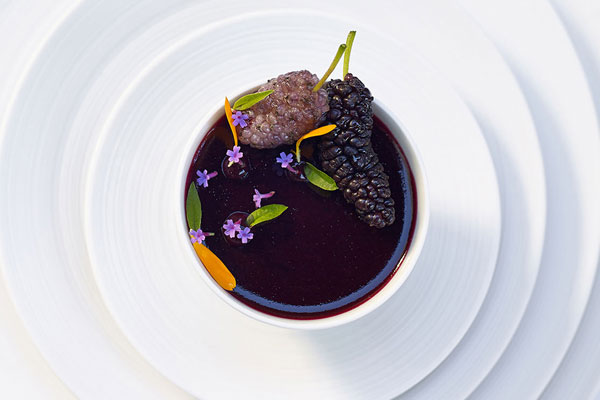
Jacobsen orchard mulberries (Deborah Jones)
It is a measure of Keller’s talent and drive that this comparatively quiet approach gave rise to a gastronomic empire: there are two Michelin three-star restaurants (The French Laundry and its New York counterpart, Per Se), making Keller the only American chef to achieve that distinction, plus eight Bouchon bistros and bakeries, and the casual Ad Hoc + Addendum restaurant.
He has co-created products ranging from Cup4Cup gluten-free flour to the new K+M chocolate bars, made with extra virgin olive oil, and written five bestselling cookbooks, with another in the works. A new retro-classic American restaurant in the Hudson Yards development in New York City is slated for 2019. And there have been innumerable awards and honours, including, of course, the No.1 position in The World’s 50 Best Restaurants in 2003 and 2004 for The French Laundry.
Equally important, if not as quantifiable, is Keller’s rigorous approach to the profession, one that has changed American gastronomy and produced some of its finest next-generation cooks. Cory Lee of Benu in San Francisco, Grant Achatz of Alinea in Chicago, Timothy Hollingsworth of Otium and Jordan Kahn of Vespertine in Los Angeles are among many who have worked the line in Yountville. Keller’s kitchen hierarchy is built on a system of mentoring, his chef de cuisine David Breeden explains, with each cook working a different position for several months, so that cook can train the next person. “The idea is, you become a disciple and you develop as a cook by learning to mentor,” Breeden says. “At the end of the day, to me, Thomas Keller’s greatest legacy is the chefs that he has inspired. He has inspired thousands and thousands of chefs.”
Legendary chef-restaurateur Daniel Boulud, who worked with Keller at the Westbury Hotel in New York City in the 1980s, puts it this way: “We can eat well today in every city in every part of the country because of Thomas Keller. It might not be because he trained that particular chef, but that chef trained other cooks. Thomas Keller has made dining better across America.”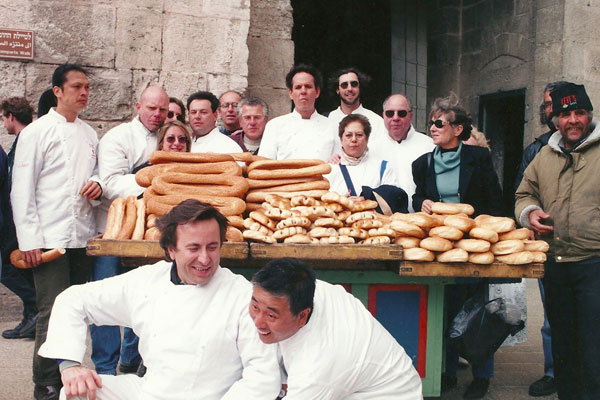
Thomas Keller (back, centre) and Daniel Boulud (front, left) (image courtesy of Boulud)
One of the first chefs to feel that influence was Ron Siegel, who ran some of San Francisco’s top kitchens before opening his own restaurant, Madcap, in nearby Marin County. Siegel was one of the four original cooks during the opening days of the French Laundry in 1994, and he vividly remembers cooking five-course meals in a space the size of a home kitchen—working frantically to make enough agnolotti for that night’s service. “There was no restaurant like it in California at the time,” Siegel says.
When they first met, before the restaurant had even opened, Keller pointed out that after Disneyland, Napa Valley was the most popular tourist attraction in California. Siegel wondered, who even thinks like that? “Did I know The French Laundry would be as big as it is today?” he says. “No. But Thomas did. He always did.”
Keller began his career as a teenager in Palm Beach, working at a restaurant that his mother managed. “My mother taught me the importance of cleanliness and the work ethic; working in front of the dishwasher, I learned organizational efficiency and critical feedback,” Keller recalls, from the luxurious confines of The French Laundry courtyard. His bespoke chef’s jacket may be about as far from a dishwasher’s apron as it gets, but he credits the “repetition, rituals, and teamwork” learned washing pots for laying the foundation to become a chef.
He went on to work in several New York restaurants, then headed to France, where he put in time at Taillevent and Guy Savoy. After he came back to New York in the 1980s, “he was really making his mark,” Boulud recalls. “He had a mentor who was French, Roland Henin, who was almost a scholar of cooking, and Thomas always felt French cuisine was a living, breathing cuisine with respect for seasonal ingredients and complexity.” Keller opened his first restaurant, Rakel, shortly after he returned. “He was doing a cuisine that was very clean, very precise, driven by ingredients and technique. He was breaking from the French classics. It was exciting,” adds Boulud.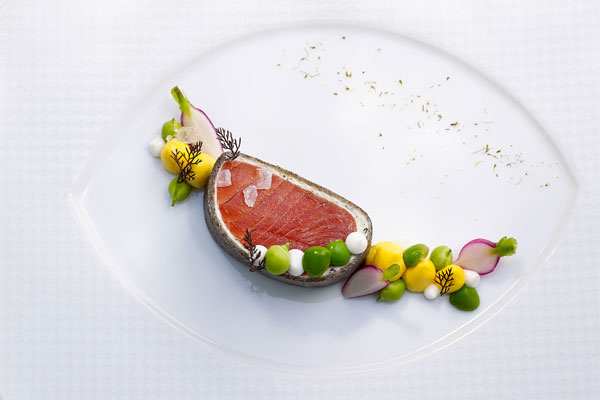
Wild king salmon (Deborah Jones)
But Rakel failed during the economic downtown of the late 1980s, and after a brief period as a consultant in New York and a chef in Los Angeles, Keller found his home – The French Laundry – in the Napa Valley. He expanded the modest kitchen garden into what eventually became the lush, three-acre garden across the street. And he became one of the first champions of local, sustainable ingredients, modernising French cuisine to reflect the local terroir along with a touch of American whimsy.
Keller says the recent remodel is largely about representing his dedication to the organic process and sustainability. The kitchen’s exterior is wrapped in a shimmery etched green glass; the planks covering the wine cellar annex are treated with a Japanese wood-burning process, eliminating the need for paint. The air-conditioning, heating, and refrigeration is regulated by a geothermal system that circulates water 450 feet below ground. That beautiful, billowy ceiling in the kitchen also controls ventilation, using less electricity than a traditional hood. “It’s just lovely, organic, and very traditional, much like the French Laundry,” he says.
The kitchen, which is filled with unusual materials such as a rough-surfaced terrazzo floor, includes a gas-fired Bonnet stove and the restaurant’s first induction range and rotisserie, and soon, open-fire hearth. Keller also plans to begin work on a six- to eight-room inn down the street, a project he has been discussing since the 1990s.
The changes to the dining room are subtle, partly because it is an historic building. The color palette is softer, and the tabletop has been uncluttered. Gone are the battalions of empty wine glasses and silverware; now diners are greeted by a pristine white tablecloth and a cobalt blue charger, making way for a procession of exquisite glassware and china, much of it newly designed for the restaurant. “It personalises the experience,” Keller explains.
Keller bristles a little when asked if he considered any modifications to his menu. “We don’t want to have a drastic change with our food, nor do we have to,” he says. Still, there was at least one tweak: instead of offering a whole breadbasket, he created a bread course with a single luscious example, such as a cushiony brioche made with applewood-smoked bacon and onion and served with Diane St. Clair’s Animal Farm butter.
Were the modifications and remodeling an effort at securing the restaurant’s legacy and future? Keller looks a little exasperated again. “Paul Bocuse said this 40 years ago,” he replies. “If your restaurant’s full of people, it’s relevant.” 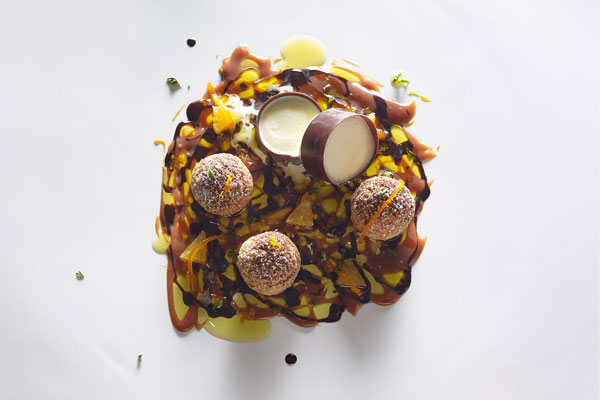
Profiteroles (Deborah Jones)
Bocuse is also a pivotal figure for Keller—a mentor and teacher who presented him with the Legion of Honour medal in France in 2011. The iconic French chef had long dreamed of having the US team on the podium of the Bocuse D’Or, the international culinary competition held every other year in Lyon, France. There had been only disappointing finishes, so Bocuse called Keller and asked him to be the representative of the US team. “You don’t say no to Paul Bocuse,” Keller says. “You say yes, and you just start. And you’re ignorant—as most Americans are, we feel that we’re going to be more successful quicker than it actually takes.”
Working with Boulud and Bocuse’s son, Jerôme, Keller created Ment’or, a foundation that supports the development of young chefs for the US team. After 10 years, the US won the gold earlier this year. “The Bocuse d’Or goes far beyond me or this restaurant or our restaurants; it goes to the heart of our profession. A lot of people may not make that connection yet – to what we do from a culinary view to our sense of national pride – but I think more and more people are starting to realise it.”
Developing young chefs – whether through Ment’or, at his own restaurant kitchens, or indirectly via his unique dishes and popular cookbooks – remains a constant theme for Keller. The French Laundry is one of just seven restaurants to lay claim to being the best in the world, and (intentionally or not) its recent revamp has helped cement its future. Ultimately, Thomas Keller’s enduring legacy as one of the great culinary figures of our times is secure.
Hear from five of the seven chefs whose restaurants have been named No.1 over the history of The World's 50 Best Restaurants:
Watch the special series of video interviews filmed for the 15th Anniversary of The World's 50 Best Restaurants, presented by Miele, on our YouTube channel and follow us on Facebook, Instagram and Twitter for more photos and restaurant news.
